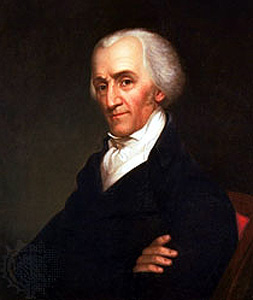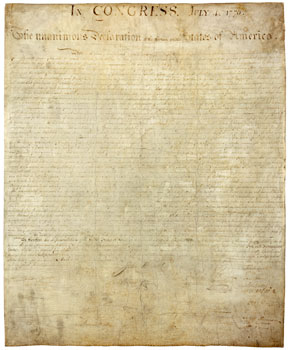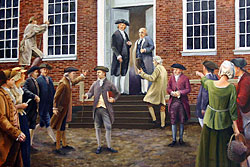People
Elbridge Gerry
1744-1814

Elbridge Gerry
By James Bogle, after John Vanderlyn, 1861. Courtesy Independence National Historical Park, Phidelphia, PA
Prologue
Elbridge Gerry of Massachusetts signed both the Declaration of Independence and the Articles of Confederation , but he is more famous for refusing to sign the United States Constitution. Born into a prominent merchant family in Marblehead, Massachusetts, Elbridge was well-educated and politically active.(1) In 1772, at the age of 28, he was elected to the Massachusetts General Court. Gerry quickly aligned himself with Samuel Adams and other members of the Whig opposition to Great Britain's colonial policies. By 1774, he was a member of the Massachusetts Provincial Congress organized in reaction to the Massachusetts Government Act passed by Parliament that same year. Two years later, he took his seat as one of five Massachusetts delegates to the Continental Congress in Philadelphia. Gerry's steadfast belief that the people were the only legitimate source of government led him to support independence in July, 1776. His tireless efforts helped persuade the delegates from the middle states to do the same. A jubilant but exhausted John Adams wrote to his friend James Warren on July 15, 1776 that Gerry was "a man of immense worth. If every Man here was a Gerry, the Liberties of America would be safe against the Gates of Earth and Hell."(2)

Elbridge Gerry worked tirelessly to persuade members of the Continental Congress to
support independence.
More info
Except for a two-year absence in the early 1780s, Gerry continued to serve as a delegate to the United States Congress. He wrestled with the mundane and difficult business of keeping the government going and administering a war that lasted longer than most had anticipated. Gerry returned to Massachusetts in 1785. A year later, he received a frustrated letter from Rufus King, a fellow Massachusetts delegate and friend. King complained that the states were so unconcerned with the affairs of the nation that Congress lacked enough delegates even to convene a quorum. "Where, my dear friend, will the evils consequent to this inattention in the States terminate? The people of the States do not know their dangerous situation; this torpor and inactivity should alarm the Guardians of the People; but indeed the Legislatures seem the least attentive." King pleaded with Gerry to "Pray think of our situation and advise me. I can open my heart with freedom to you; you are now at home, and will be concerned in the Government of the State."(3)
An "excess of democracy"
Rufus King had correctly anticipated that his friend would be preoccupied with Massachusetts issues and politics. Neither King nor Gerry could have predicted, however, that during the fall and winter of 1786 Gerry would be getting a frightening, first-hand view of citizens laying siege to their own government and constitution. The Massachusetts government struggled to put down the rebellion through a combination of military force and the offer of pardons in exchange for oaths of allegiance. As the danger passed and Daniel Shays and other insurgent leaders went into hiding, Massachusetts and eleven other states chose delegates to attend a Convention in the spring and summer of 1787 to revise the ineffectual Articles of Confederation. Elbridge Gerry's years of experience in Congress made him an obvious choice. He proved to be a hard-working delegate who contributed frequently to the discussion and debates (James Madison's notes reveal that he was the sixth-most talkative delegate at the convention.) A statement by Gerry early in the proceedings revealed how badly shaken the insurrection in Massachusetts had left him:
The evils we experience flow from the excess of democracy. The people do not want virtue; but are the dupes of pretended patriots. In Massts. it has been fully confirmed by experience that they are daily misled into the most baneful measures and opinions by the false reports circulated by designing men, and which no one on the spot can refute…He had he said been too republican heretofore: he was still however republican, but had been taught by experience the danger of the levilling spirit.(4)

Elbridge Gerry arrived at the Philadelphia Convention convinced that Shays'
Rebellion was a result of "the excess of democracy" afflicting Massachusetts
and the other states.
Gerry agreed with the other Massachusetts delegates, including Rufus King, that a stronger, fiscally sound central government was the only solution to the unrest in Massachusetts and other states. In the end, however, he decided the proposed Constitution would create more problems than it would solve. Like George Mason of Virginia, Gerry resisted intense pressure from other delegates to sign the Constitution and thus present a unanimous, united front. Indeed, the urgings of Benjamin Franklin and others seemed to harden Gerry's resolve. On September 17, 1787, Gerry tried to explain his reasoning to his fellow delegates:
Whilst the plan was depending, he had treated it with all the freedom he thought it deserved. He now felt himself bound as he was disposed to treat it with the respect due to the Act of the Convention. He hoped he should not violate that respect in declaring on this occasion his fears that a Civil war may result from the present crisis of the U. S. In Massachussetts [sic], particularly he saw the danger of this calamitous event-In that State there are two parties, one devoted to Democracy, the worst he thought of all political evils, the other as violent in the opposite extreme. From the collision of these in opposing and resisting the Constitution, confusion was greatly to be feared.(5)
Gerry believed that the radically stronger federal government outlined in the proposed constitution would inevitably alienate those who wanted to keep more authority with the individual states. He thought that the resulting plan "should have been proposed in a more mediating shape, in order to abate the heat and opposition of parties. As it has been passed by the Convention, he was persuaded it would have a contrary effect."(6)
Having already gotten a taste of the anarchy and horror of a civil war with Shays' Rebellion, Gerry was not willing to risk the discord and violence he thought the new federal plan might produce. This fear, combined with his criticisms that the constitution lacked a Bill of Rights and a sufficiently clear separation of powers, forced Gerry to regretfully conclude that he "could not therefore by signing the Constitution pledge himself to abide by it at all events."(7)
Gerry returned to Massachusetts convinced that he had done the right thing. On October 18, 1787, he wrote a letter to the Massachusetts General Court i dentifying his objections to the Constitution. Gerry confessed that "[i]t was painful for me, on a subject of such national importance, to differ from the respectable members who signed the Constitution." But, he continued, "conceiving, as I did, that the liberties of America were not secured by the system, it was my duty to oppose it." He did, however, assure the Legislature that despite its flaws, "in many respects, I think it [the Constitution] has great merit, and, by proper amendments, may be adapted to the "exigencies of government, and preservation of liberty."(8)
The Dictates of Conscience
In the winter of 1788, delegates from towns across Massachusetts gathered in Boston to debate and vote on whether or not their state would ratify the new constitution. At least nine of the thirteen states would have to ratify in order for the Constitution to go into effect. Approval by Massachusetts was crucial to the ratification efforts and strategies of the Federalists. Elbridge Gerry was not a delegate but he attended at the request of the convention "to take a seat in the house to answer any question of fact, from time to time, that the Convention may want to ask respecting the passing of the constitution." Within only a few days of his "tak[ing] a seat," controversy erupted. On January 19, some delegates objected to Elbridge Gerry's speaking on an issue and, according to his critics, overstepping his role as a non-elected, non-voting observer. Tempers flared; Elbridge Gerry and Frances Dana of Cambridge had to be physically separated.(9) Gerry wrote an indignant letter to William Cushing, the vice president of the convention, in which he blamed his poor treatment on the opposing political views of Federalist delegates determined to silence him.
It is true, sir, I differ in opinion from a number of respectable members of your honorable house, on the subject of the proposed constitution, but I flattered myself, that not a member could be found so deficient in liberality, as to bear animosity towards me on this account…if there is at this time so little freedom in America, as that a person in discharging a most important public trust, cannot conduct according to the obligations of honor, & dictates of his Conscience, it appears to me of little consequence, what form of Government we adopt, for we are not far removed from a state of slavery.(10)
Gerry never attended the convention again; on February 7, 1788, delegates approved the Constitution by a 19-vote margin of 187 for ratification and 168 against.(11) At the same time, the convention endorsed Gerry's reservations and criticisms by recommending that the new Constitution be amended to include a bill of rights and specific limitations on federal encroachments on state authority.(12)
As the momentum for ratification throughout the states increased, Gerry felt compelled once again to explain why he had been among the few delegates who had not signed. In 1788, he expressed his views in a pamphlet titled, Observations on the New Constitution, and on the Federal and State Conventions. Gerry once again reminded readers that the Philadelphia Convention delegates had far exceeded their original instructions merely to revise and amend the existing national constitution, the Articles of Confederation.
It is an undisputed fact that not one legislature in the United States had the most distant idea when they met when they first appointed members for a convention, entirely commercial, or when they afterwards authorized them to consider on some amendments of their Federal union, that they would without any warrant from their constituents, presume on so bold and daring a stride, as ultimately destroy the state governments , and offer a consolidated system, irreversible but on conditions that the smallest degree of penetration must discover to be impracticable.(13)
It seemed, though, that Gerry was more and more out of step with what was becoming a Federalist victory. Rufus King dismissed Gerry's arguments in the Observations as "a pitiful performance." Two years earlier, King had sought his "dear friend" Gerry's advice. By 1788, King was claiming that Elbridge Gerry "sinks daily in public esteem, and his bantling goes unnoticed."
Epilogue
Elbridge Gerry continued to serve his state and his country under the new Constitution. He represented Massachusetts in Congress as a member of the House of Representatives from 1789-1792. Despite his earlier Antifederalist position, Gerry supported the Federalist policies, including Alexander Hamilton's controversial plan in which the United States government assumed the war debts of the states. Gerry served as a member of a delegation to France for President John Adams. Upon his return, he broke with the Federalist party and joined Thomas Jefferson's Democratic Republicans. He made several unsuccessful runs for Governor of Massachusetts until he was finally elected in 1810. While governor, his name became famously and forever linked to the strategy of creative re-districting to increase party majorities, known as "Gerrymandering." He was elected vice president under James Madison in 1812; he died in office in 1814 at the age of 70.
About This Narrative
Note: All narratives about people are, to the extent possible, based on primary and secondary historical sources.
See Further Reading for a list of sources used in creating this narrative. For a discussion of issues related to telling people's stories on the site, see: Bringing History to Life: The People of Shays' Rebellion
| Print | Top of Page